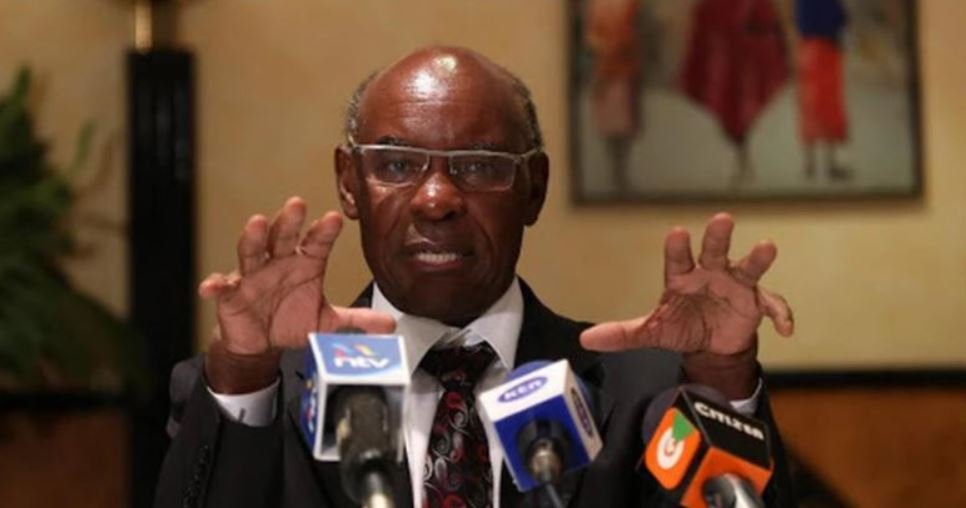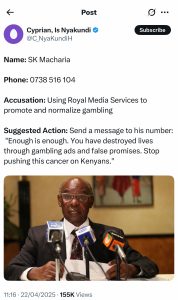In the heart of Kenya’s bustling cities and quiet villages alike, a silent epidemic has been growing – one that destroys families, consumes savings, and sometimes ends in the ultimate tragedy.
For years, betting companies have been expanding their reach, with technology making gambling accessible to anyone with a smartphone.
But now, as the devastation becomes impossible to ignore, Kenyans are fighting back against those they see as profiting from their misery.
At the center of this growing storm is media mogul SK Macharia, owner of Royal Media Services (RMS) – Kenya’s largest media conglomerate that operates popular stations including Citizen TV, Radio Citizen, Inooro TV, Ramogi FM, Chamgei FM, and several other vernacular stations reaching millions of Kenyans daily.
The Breaking Point
“Enough is enough. You have destroyed lives through gambling ads and false promises. Stop pushing this cancer on Kenyans.”
These words, part of the viral “tumsalimie” campaign, were sent to SK Macharia’s personal phone number after it was shared online by influential blogger Cyprian Nyakundi, who has emerged as a leading voice in the anti-gambling movement.
The campaign comes after weeks of Kenyans sharing devastating personal stories about gambling addiction, particularly related to games like Aviator, a popular online betting game where players watch a virtual airplane take off and must cash out before it flies away – a simple yet addictive mechanism that has ruined countless lives.
What makes Macharia’s position particularly controversial is his company’s dual role – not just as a platform for gambling advertisements but as a direct beneficiary through its own betting platform, SHABIKI, which RMS owns and operates.
The Human Cost
The stories emerging from victims paint a devastating picture of addiction’s toll:
Dan, once employed in sales, embezzled over Ksh 800,000 from his employer to feed his Aviator addiction.
After losing his job, he borrowed money to continue gambling.
A lucky win of Ksh 1.8 million briefly gave him hope – he bought a car for Ksh 900,000 and celebrated with friends.
But the addiction soon consumed that windfall too.
Today, his construction project sits abandoned, his wife has left him, and he’s reduced to begging for small amounts of money.
A once-successful borehole drilling business owner in Moi’s Bridge watched his life crumble as Aviator consumed millions of shillings, including clients’ money.
His marriage collapsed, his home construction stalled, and his once-thriving business reputation was destroyed.
Dorothy Katulu, a 28-year-old pregnant woman, is now serving a three-year sentence at Lang’ata Women’s Prison after gambling away Ksh 200,000 from her savings group.
As treasurer, she betrayed her group’s trust, hoping to multiply the money on Aviator but losing everything instead. She will give birth to her first child behind bars.
Media’s Role in the Crisis
The public’s anger toward Macharia and other media owners stems from their perceived hypocrisy – media personalities who should inform and protect the public instead use their platforms to promote gambling, often earning commissions from the very addiction they help create.
“I’m a presenter at a leading Kamba media house,” confessed one whistleblower. “The real problem isn’t Aviator, but the media houses lying to their audience, encouraging them to gamble with promises of easy money. Presenters earn a 20% commission from the money generated.”
Radio stations, particularly vernacular ones with deep community reach, have been especially criticized for their role in normalizing gambling.
Royal Media Services’ extensive network of stations – broadcasting in languages including Kikuyu, Luo, Kalenjin, Kamba, and others – gives them unprecedented access to vulnerable communities across Kenya.
The backlash represents a significant shift in how Kenyans view gambling and those who profit from it.
What was once seen as harmless entertainment or even a path to financial freedom is increasingly recognized as an exploitative industry that preys on desperation.
Mental health professionals report alarming increases in gambling-related cases, with addicts suffering from depression, anxiety, and suicidal thoughts.
The social cost extends beyond individual gamblers to their families and communities, with stories of children going hungry, education funds being squandered, and family businesses collapsing.
As pressure mounts on SK Macharia and other media owners, the government faces calls for stricter regulations or even outright bans on certain forms of gambling.
Critics argue that the current regulatory framework is woefully inadequate to address the scale of the problem.
For now, the “tumsalimie” campaign continues to gain momentum, with thousands of Kenyans using social media to share their stories and demand accountability.
The message is clear: those who profit from gambling can no longer ignore its devastating consequences.
Whether this growing public outcry will lead to meaningful change remains to be seen. But one thing is certain – Kenyans are no longer willing to remain silent as gambling destroys their communities, one bet at a time.
Kenya Insights allows guest blogging, if you want to be published on Kenya’s most authoritative and accurate blog, have an expose, news TIPS, story angles, human interest stories, drop us an email on [email protected] or via Telegram
Share via:





